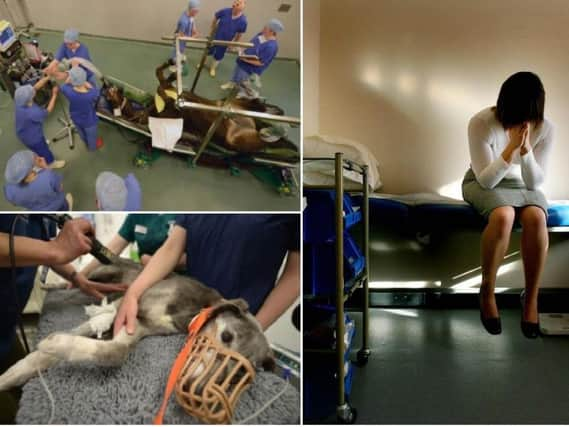Vet graduates 'more prone to suicide' due to euthanising animals and working long hours


Final year students at the University of Glasgow's School of Veterinary Medicine said the stress of working 14-hour days after graduation puts young vets in a position where they can struggle to take care of their own wellbeing.
Pressures in the job can include having to put healthy animals to sleep, and watching bereaved owners struggle to cope with losing their companion.
Advertisement
Hide AdAdvertisement
Hide AdAround a third of vets are believed to experience struggles with mental health, stats show.
Seasoned vets are used to it but new graduates have gone from having all this intense support to being thrown into a job that becomes your life.
"They tell us about mental health and how to look after yourself but I think when you graduate, it restricts it.
"When you are working 14 hours, you don't have time to go to the gym, to meal prep."
The American veterinary student believes that 'Type A' personalities are drawn to her line of work and may be more susceptible to stress or feelings of failure.
"You get to know the owners, you get to know the animal, but you just have to let it go.
"I was seeing a patient for seven days, it was a dog with cancer.
"The couple didn't have children so that dog was their baby.
Advertisement
Hide AdAdvertisement
Hide AdThe couple had a lot of money and were willing to do anything to save the dog.
"But, ultimately, you can't pay for life.
"The hardest thing was having to put it down.
"They were sobbing and the woman was hugging me.
"I had another woman who had a really bad depression, she was suicidal and we had to put the dog to sleep.
"The woman was having to lose that one thing that was keeping her going.
"Within five minutes, it's the next patient. It's not just about the profession. There is a certain type of person who is attracted to veterinary medicine, Type A and driven who want to help others.
"You are dealing with death every day and you want to give 100 per cent every day. So we are already at risk."
"You might be having to put a healthy animal to sleep, then ten minutes later you have your next patient and it might be a completely different scenario - you have to be excited for an owner with a new puppy.
"I had to put a relatively healthy dog to sleep.
"The owner was struggling with a condition that was causing the dog to be up all night, mess the floor.
"It wasn't completely healthy but, given a different scenario, it could have been managed but the owner couldn't deal with it.
"So that was quite hard.
Advertisement
Hide AdAdvertisement
Hide Ad"I had to reason with it and think about it from the owner's perspective and that the dog's welfare might not be that good."
She grew up in the Scottish Borders and plans to specialise in farming, while Ms Ioannu plans to specialise in oncology and small animals.
The final year students are co-presidents of Glasgow University Veterinary Medical Association.
Ms McColm said: "I'm from a farming background and I always knew I wanted to work with animals.
"You have to love working with people too, animals don't talk to you."